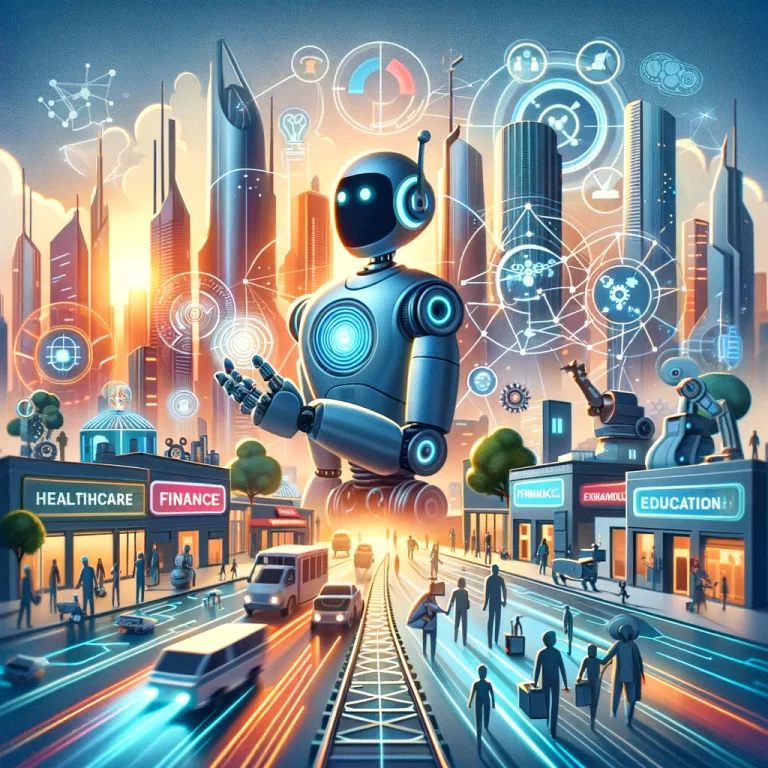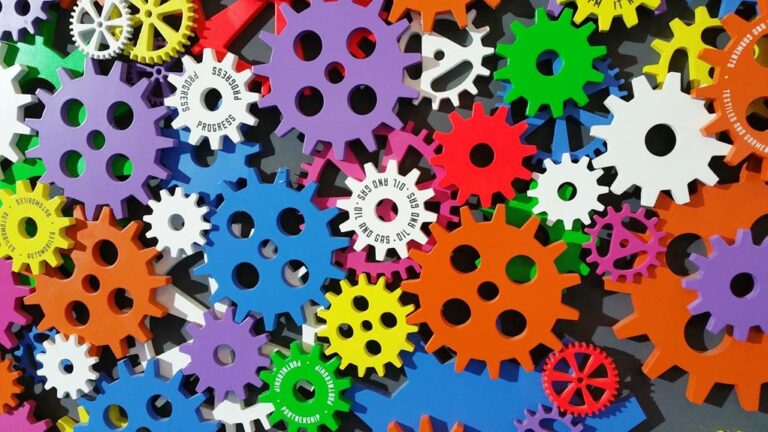Just like the Luddites during the Industrial Revolution, I'm witnessing a seismic shift as automation takes center stage in our modern economy. It's clear to me that this technological tide will not only reshape how we work but also redefine the very nature of jobs. I'm talking about a future where routine tasks are offloaded to machines, freeing us humans to pursue work that demands creativity and empathy—qualities no robot can replicate. As I see it, job landscapes will morph as industries adapt, demanding that we evolve alongside them. This isn't just about displacement, though; it's an opportunity for liberation, for breaking the chains of monotonous labor. Education and policy will need to catch up, ensuring we're all equipped to navigate the changing tides of employment. Automation isn't just changing the game; it's offering us a whole new playing field.
The Rise of Automation
I've observed that a significant number of jobs are increasingly becoming automated, signaling a transformative shift in the employment landscape. As a strategist, I perceive this trend not as a harbinger of joblessness, but as an evolution towards a liberated workforce. This evolution is driven by machine learning, a technology that enables computers to adapt and perform tasks that once required human cognition and intuition. As a result, routine and repetitive jobs are being phased out, making room for human creativity and strategic thinking to take center stage.
Analyzing the dynamics of this shift, I recognize that machine learning doesn't merely replace jobs; it augments human capabilities and creates new opportunities. It's crucial to envision the future workplace as one where humans and intelligent systems coexist, complementing each other's strengths. This synergy will forge new career paths and demand a recalibration of skills.
In the arena of robotic ethics, we're compelled to strategize responsibly. It's not enough to automate; we must consider the ethical implications of displacing workers and ensure that the transition towards automation is just and humane. As agents of change, we're tasked with developing strategies that foster an inclusive future where technology serves to liberate, not subjugate.
To those yearning for liberation from monotonous labor, the rise of automation presents a beacon of hope. It's a chance to redefine our roles in society, to engage in more meaningful and fulfilling work. The strategic challenge before us is to navigate this shift with foresight and humanity, ensuring that as we embrace the future, we uplift everyone along the way.
Job Displacement Realities
Amidst the rise of automation, I'm acutely aware of the stark reality that many current jobs are at risk of displacement due to advancing technologies. As we navigate this transformative era, it's essential to confront the forthcoming challenges with a blend of vision, strategy, and keen analysis.
To grab your attention, consider these pivotal points:
- Technological unemployment is not a distant phenomenon—it's happening now, and it's reshaping industries and economies at an unprecedented pace.
- Worker anxiety is escalating as employees across various sectors grapple with the uncertainty of their professional futures.
- Strategic retraining and upskilling programs are critical in preparing the workforce for the inevitable shift towards more complex, automation-resistant roles.
- Visionary leadership is required to guide the transition, ensuring that the march of progress is matched by the advancement of worker empowerment and opportunity.
The key to harnessing the full potential of automation lies not in resistance, but in adaptation. We must be strategic in our approach, analyzing which roles can be enhanced with automation and which new opportunities can be created. This is not just about staying relevant; it's about liberation from the mundane, freeing up human creativity and intelligence for more fulfilling work.
As I look to the future, I'm convinced that with the right strategies, we can mitigate technological unemployment and alleviate worker anxiety. By investing in education and fostering a culture of lifelong learning, we can facilitate a smooth transition into a more automated world. The goal is to ensure that automation becomes a catalyst for growth, not a harbinger of obsolescence.
Evolving Skill Requirements
As we pivot towards a future dominated by automation, I can't help but notice the shifting skill sets required to thrive in the evolving job market. It's clear that digital literacy and adaptive learning are no longer optional; they are crucial for survival and success. I've come to understand that to be liberated from the dread of obsolescence, we must embrace these changes with strategic intent.
The table below encapsulates the contrast between past and future skill requirements:
| Traditional Skills | Evolving Skills |
|---|---|
| Manual Dexterity | Digital Literacy |
| Routine Problem-Solving | Adaptive Learning |
| Single-Discipline Expertise | Cross-Functional Competency |
This strategic approach to knowledge emphasizes that the future beckons for a workforce that is as fluid as the technology it interacts with. Digital literacy isn't just about understanding how to use technology, but also about leveraging it to create, innovate, and solve complex problems. It's about reading the digital landscape and anticipating the next wave of innovation.
Adaptive learning, on the other hand, is a commitment to perpetual self-improvement. It's an analytical mindset that embraces change, learns from it, and uses it as a stepping stone to new opportunities. In a world where change is the only constant, the capacity to adapt is synonymous with the ability to lead and succeed.
Industry-Specific Impacts
Automation's encroachment into various sectors will inevitably lead to a profound reshaping of job roles and industry landscapes. As we navigate this transition, we're not just looking at the modification of existing jobs but also the creation of new roles spurred by sector innovations. In the midst of these changes, businesses and employees alike are grappling with regulatory challenges that are evolving just as rapidly as the technology itself.
Let's hone in on the specifics with a numeric list that outlines the industry-specific impacts:
- Manufacturing: The epitome of automation, this sector will see a significant shift from manual labor to supervisory and engineering roles, as robots and AI take over repetitive tasks.
- Healthcare: With the introduction of AI diagnostics and robotic surgery, there will be a heightened demand for tech-savvy medical professionals who can work alongside these advanced tools.
- Retail: E-commerce platforms, automated inventory management, and cashier-less stores are transforming retail jobs, emphasizing customer service and tech maintenance roles.
- Finance: Automation in the finance sector means a decline in traditional banking roles and a surge in fintech positions focusing on data analysis and cybersecurity.
As I analyze these developments, it's clear that our strategic approach must prioritize adaptability and continuous learning. We're on the cusp of a liberation from the drudgery of repetitive tasks, which will free up human creativity and strategic thinking. However, this transition won't be without its challenges. To thrive in this new era, we must anticipate the sector-specific impacts and prepare to navigate the regulatory challenges that will shape the automation landscape. The future is knocking, and it's time we answer with boldness and strategic finesse.
Economic Implications
While considering the vast changes automation brings, I can't help but focus on its economic implications, particularly how it'll redefine labor markets and productivity. The strategic integration of automation isn't just about efficiency; it's a profound evolution of how we value human contribution. We're at a crossroads where machine ethics must be paramount - ensuring technology augments rather than replaces human potential.
Automation's role in globalization effects is pivotal. As industries across the globe integrate automated processes, the economic landscape shifts, leading to a redistribution of jobs and a reimagining of global economic power dynamics.
Here's a table that casts light on the stark contrasts we're facing:
| Optimistic Outlook | Concerning Reality |
|---|---|
| Enhanced Productivity | Job Displacement |
| Economic Growth | Wage Stagnation |
| Global Prosperity | Socio-Economic Divide |
This table isn't just data; it's a call to action. We must navigate these waters with a strategic mindset, leveraging automation not only for profit but as a catalyst for economic liberation. Our goal should be to harness the positive outcomes and mitigate the risks.
The Changing Workplace
As we gaze upon the horizon of the workplace's future, it's clear that remote work is not just a trend, but a fixture reshaping our professional landscapes. The integration of collaborative technology is now a strategic imperative, facilitating seamless connections across global teams. Meanwhile, the evolution of skill requirements compels us to rethink and retool our educational and professional development frameworks to stay ahead of the automation curve.
Remote Work Increasing
I've noticed that, amid the rise of automation, there's a significant shift towards remote work, reshaping the traditional workplace landscape. Virtual teams and digital nomadism are not just buzzwords; they're harbingers of a liberated workforce. Here's why remote work is not just a trend, but a strategic evolution:
- Empowerment: Individuals gain control over their work-life balance, leading to enhanced productivity.
- Global Talent: Companies can tap into a worldwide pool of experts, unhindered by geographic constraints.
- Cost Efficiency: Reduced overhead for businesses and eliminated commutes for employees translate to significant savings.
- Sustainability: Diminished need for office space and travel lessens the ecological footprint, aligning with broader environmental goals.
This isn't just change; it's progress towards an adaptive, liberated future.
Collaborative Technology Integration
Embracing collaborative technology, I'm observing firsthand how it's reshaping the workplace, making teams more agile and connected despite geographical distances. The future I envision hinges on human-AI collaboration, with adaptive interfaces that not only understand our commands but also anticipate our needs. This isn't a distant dream—it's an unfolding reality where machines enhance human potential, liberating us from mundane tasks.
Strategically, this integration signifies a leap toward a liberated workforce wherein creativity and strategic thinking become the premium currencies. Analytically, the data backs up a surge in productivity and innovation. By harnessing the power of AI, we're crafting a new echelon of work where collaboration transcends physical boundaries, empowering individuals to excel in a digitized, interconnected world.
Evolving Skill Requirements
In light of automation's rise, I'm adapting to a workplace where skill sets must evolve to meet the demands of new technologies and workflows. The transformation beckons a strategic rethinking of capabilities and a commitment to perpetual growth. Here's what I see as pivotal:
- Digital literacy: Understanding and leveraging digital tools is non-negotiable.
- Adaptive learning: Embracing continuous education to stay relevant.
- Problem-solving: Analytical skills to navigate complex automated systems.
- Interpersonal agility: Collaborating effectively with both humans and AI.
I'm positioning myself at the forefront of this evolution, recognizing that liberation from mundane tasks grants me the opportunity to engage in more meaningful, creative work. My mission is clear: adapt strategically, learn adaptively, and thrive in the automation era.
Automation and Wage Patterns
As we look to the horizon of a technologically transformed labor market, I foresee an intensifying stratification in wage patterns, with automation acting as a catalyst for widening wage gaps. The reshuffling of job categories will not only redefine the landscape of employment but will also demand a strategic reevaluation of skill-based compensation. It's imperative that we anticipate and strategically plan for these shifts, ensuring that the fruits of automation are equitably distributed and do not exacerbate existing economic disparities.
Wage Inequality Increase
I've observed that automation's rise is leading to a widening wage gap, as high-skill workers benefit disproportionately compared to their low-skill counterparts. This trend is intensifying social stratification and amplifying equity challenges within the job market. To address these issues, we must consider strategic actions:
- Implement skills training for vulnerable workers.
- Advocate for policies that ensure equitable access to technology.
- Develop new job roles where human skills are irreplaceable.
- Promote a living wage that reflects the changing economy.
A visionary approach towards a liberated future involves dismantling the barriers that prevent equitable distribution of wealth. As we navigate the terrain of automation, it's crucial to ensure that our strategy fosters an inclusive economic landscape where every individual has the opportunity to thrive.
Job Category Shifts
Automation's encroachment is shifting job categories, manifesting in distinct wage patterns that I'll explore next. As we witness sector transitions, it's essential to strategize for the inevitable workforce adaptation. Routine, manual jobs are increasingly automated, leading to a surge in demand for creative, strategic roles. This shift doesn't just alter job descriptions—it revolutionizes wage structures. High-skilled positions may command premium salaries, while mid-level roles face compression.
I'll delve into how this wage stratification compels a visionary approach to education and vocational training, equipping individuals with the tools for liberation from outdated career constraints. Understanding these evolving dynamics is crucial for navigating the future job landscape, where strategic foresight transforms the challenge of automation into opportunities for personal and economic emancipation.
Skill-based Wage Changes
Over time, the rise of automation has led to a notable bifurcation in wage patterns, favoring those who possess advanced technical skills and creative capabilities. Here's how I envision the landscape:
- Competency Premiums: Rewards for those who master skills that machines can't replicate.
- Creative Dividend: Prosperity for the innovators who devise novel solutions and experiences.
- Technical Acuity: Financial advantage for individuals proficient in designing and managing automated systems.
- Wage Polarization: A growing divide between high-income, skill-intensive roles and lower-wage, automatable occupations.
In this transformative era, I'm convinced that upskilling is our key to liberation. By strategically honing our competencies, we can not only adapt but thrive, ensuring that wage polarization becomes a catalyst for personal and collective empowerment, rather than a barrier.
Education and Training Shifts
As we delve into the realm of education and training, it's clear that the rise of automation calls for a profound reimagining of our approach to preparing the workforce. The traditional model of education, where one receives training early in life and applies it for decades, is becoming obsolete. Instead, the concept of lifelong learning is taking center stage, allowing individuals to continuously acquire new skills in sync with the evolving demands of the automation age.
This shift isn't just strategic—it's necessary. The credential revolution is underway, signaling a transition from degree-based qualifications to skill-based certifications that are agile, accessible, and aligned with the needs of a dynamic job market. It's about breaking the shackles of outdated educational norms and liberating the workforce to pursue learning as a perpetual journey, not a one-time event.
To illustrate this transformation, consider the following table:
| Traditional Education | Transition Phase | Future Model |
|---|---|---|
| Degree-focused | Hybrid learning | Skill-based certifications |
| Static curriculum | Adaptive courses | Personalized learning paths |
| Classroom-centric | Online platforms | Integrated learning environments |
| Fixed schedules | Flexible access | On-demand education |
| Single-discipline expertise | Cross-disciplinary skills | Continuous skill evolution |
This table encapsulates the strategic pivot from rigid, one-size-fits-all education to a fluid, customizable learning ecosystem. It's a vision of education where adaptability reigns, empowering individuals to navigate the tumultuous seas of technological change. As we stand at the precipice of this new era, it's essential that our strategies reflect a commitment to emancipating the human potential, fostering a society where automation and human ingenuity coalesce to unveil unprecedented possibilities.
Policy Responses and Strategies
I'll now explore how governments and institutions are implementing policies and strategies to mitigate the impact of automation on employment. As we grapple with the seismic shifts that automation brings, it's vital that our approach is both visionary and rooted in social equity. Our strategies must be multifaceted, ensuring that as we transition, no one is left behind. Here's how we can strategically pivot:
- Develop Comprehensive Regulatory Frameworks: To ensure automation benefits all, we must craft regulatory frameworks that foster innovation while safeguarding workers' rights.
- Promote Social Equity: Targeted policies are needed to close the divide between the "automation-rich" and the "automation-poor."
- Invest in Lifelong Learning: Education systems should be overhauled to provide continuous skill development, adapting to the evolving job market.
- Support Transitioning Workers: Implement robust support systems for workers displaced by automation, including retraining programs and financial aid.
By weaving these threads into the fabric of our policy-making, we can construct a future that is not only technologically advanced but also socially just. Regulatory frameworks must be dynamic, evolving alongside technological advancements to preemptively address issues of employment displacement and inequality.
Investing in social equity ensures that the fruits of automation are distributed fairly, enabling a liberated society where each individual has the opportunity to thrive. Lifelong learning initiatives are crucial for empowering people to adapt and excel in new roles created by automation. Lastly, supporting transitioning workers with empathy and strategic planning will ease the socio-economic turbulence that comes with automation-led changes.
The path forward requires a blend of analytical prowess and human-centered strategy. We must be bold, visionary, and unyielding in our quest for a future where technology amplifies our potential without compromising our humanity.
Frequently Asked Questions
How Might Cultural Attitudes Towards Work Change as Automation Becomes More Prevalent?
As automation takes hold, I anticipate a shift in cultural attitudes where work identity becomes fluid, and leisure value soars. I see us strategically reassessing our roles, finding freedom beyond traditional labor. This vision isn't just about employment; it's a transformative strategy towards liberation, where work is a choice, not a necessity, and our lives are enriched with purposeful leisure, embracing the full spectrum of human potential and creativity.
In What Ways Could Automation Influence Urban Planning and the Development of Cities?
Automation could revolutionize urban planning by integrating smart infrastructure that adapts to our needs, streamlining city life. It'll likely prompt zoning revisions to accommodate new tech hubs and less need for traditional commercial spaces, shifting cityscapes towards mixed-use areas. I envision strategic redesigns that liberate us from outdated urban models, fostering communities where work, life, and play coexist seamlessly, thanks to the thoughtful application of automation in our cities' evolution.
How Could Automation Potentially Affect Mental Health and Job Satisfaction Among Workers?
I foresee automation heightening career anxiety, as workers grapple with the fear of skill obsolescence. It's essential to strategize for an evolving job market, where mental health and job satisfaction might wane if we don't adapt. Embracing lifelong learning is key. I'll focus on upskilling to remain agile in this shift, ensuring not only my employability but also a sense of liberation from the threat of automation.
What Role Might Automation Play in Addressing or Exacerbating Workplace Discrimination and Diversity Issues?
I believe automation could be a double-edged sword for workplace diversity. If we're strategic, it can promote equal opportunity by removing human prejudices from hiring. However, I'm cognizant that bias algorithms can perpetuate discrimination if not carefully designed. It's my vision that, through vigilant development and oversight, automation will help us dismantle barriers, ensuring a liberated and inclusive future for all in the workforce.
Can Automation Lead to New Forms of Art or Creative Expression in the Job Market?
Absolutely, I believe automation can spark a renaissance in the job market—think robotic artists and creative algorithms crafting masterpieces. It's not just a strategy; it's a vision of liberation from conventional constraints, allowing for innovation in artistry. With these digital creators, we're not just analyzing trends; we're setting them, opening doors to unprecedented forms of creative expression. It's a future where creativity and technology blend in harmony.



